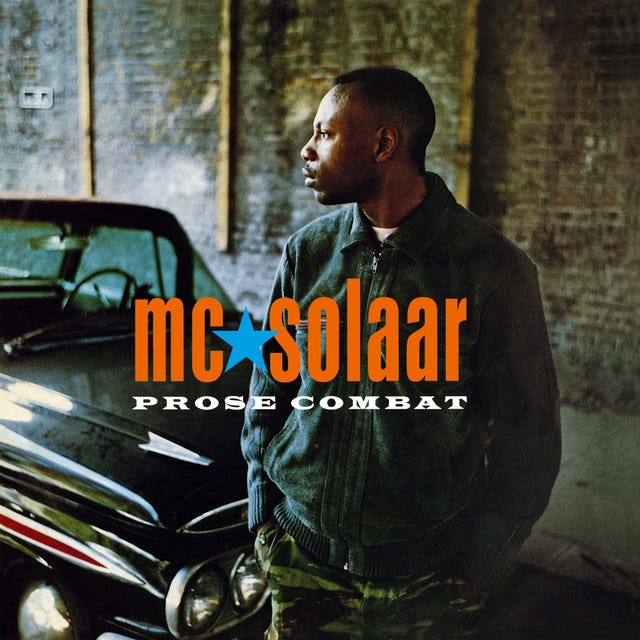Genre of the Day - French Hip-Hop
Album of the Day - Prose Combat by MC Solaar (1994)
Perhaps it’s only another symptom of American exceptionalism, but one thing that I’ve noticed often is that American audiences tend to treat every unfamiliar rap scene as a full-on novelty; media outlets circulate headlines like “can you believe this Brazilian drill?!” as if rap hasn’t been a global phenomenon since the 1990s. I guess I tend to overestimate my country’s global awareness because of my own personal bubble, but I also don’t want to lean too much into the Americans-know-nothing rhetoric that is equally bothersome. Nonetheless, some might be shocked to hear that France constitutes the second-largest market for rap in the entire world—today, we delve into that rich parallel world.
French hip-hop—or ip-op, given the French language’s phonology which silences the letter h—originates from the world’s first hip-hop diplomatic mission, led by ambassadors Fab Five Freddy and graffiti artists FUTURA 2000 and Dondi White who visited Paris in 1982. Awareness of the emergent American genre inspired the first international hip-hop themed TV program in 1984, H.I.P.H.O.P., hosted by MC Sidney. Hip-hop subsequently became the sound of the underground in the banlieues of Paris by the late 1980s. Banlieues, the suburbs, have the opposite reputation in France as they do in the US, often home to lower-cost and public housing and treated both literally and socially as a periphery. Just as hip-hop acted as a platform for all manners of inner-city storytelling in the US, the form offered the same aspirational and narrative possibilities for artists in the banlieues.
Hip-hop was essential for sustaining a consciousness that had been awakened earlier in the ‘80s, when tens of thousands of young French people, many of whom were children of immigrants, walked in the 1983 March for Equality and Against Racism. This sense of unity and communalism characterized hip-hop’s early DIY decades in France—the store Ticaret was one cornerstone both of hip-hop fashion and creation, offering an in-store studio for young rappers and producers, and the underground station Radio Nova disseminated the rhymes of up-and-coming emcees to anyone tuned in after midnight. Creating hip-hop beats that worked with the French language’s different inflections was a trial and error process: Jeff Dominguez, a sound engineer in the ‘90s, noted how the snare drum had to be reduced and the kick brought up to not bury syllables, a fascinating crossover of linguistics with production. Today, stars like Gims, PNL, and Aya Nakamura command mass attention, including internationally, and there are vibrant scenes across the country drawing upon global trends and genres particular to the wider Francophone world. And of course, Paris’s luxury has also become a muse of and shorthand for success in American hip-hop.
MC Solaar has been heralded as the finest French emcee of his moment, and his 1994 boom-bap oeuvre Prose combat plainly lays out why, whether you’ve flirted with the French language or not. A simple, soulful sample basis and crafty turntablism lays the background of “Obsolète” as he deftly through syllables that might get quickly caught on another tongue. His motifs and references thumb their nose at the notion that non-American rap is simply a pastiche—he makes fun of American movies as obsolete, references Proust, and cheekily regales the listener with a very French tale of receiving jam as a flirtatious come-on. On “Nouveau western,” he serves up cool detachment in a Serge Gainsbourg sample. His graceful yet lightning-fast flow of “À la claire fontaine” is among the best rap dictions I’ve ever heard, which he goes onto deploy in a powerful and clever critique of war in “La concubine de l’hemoglobine.” The production is equally chic and meticulous: with the exclusion of the evidently temporal boom-bap horns, the luxe atmospheres of “Dévotion” sound decades ahead, like the bucolic, chilled-out beats so essential to the 2010s or the floaty bliss of “Temps mort.” Though he often asserts his talent and primacy amongst his peers, and it’s well-merited, he recruits collaborators for the posse cut “L'NMIACCd'HTCK72KPDP,” illustrating how a hip-hop scene as robust as France’s has room for many musical poets.




